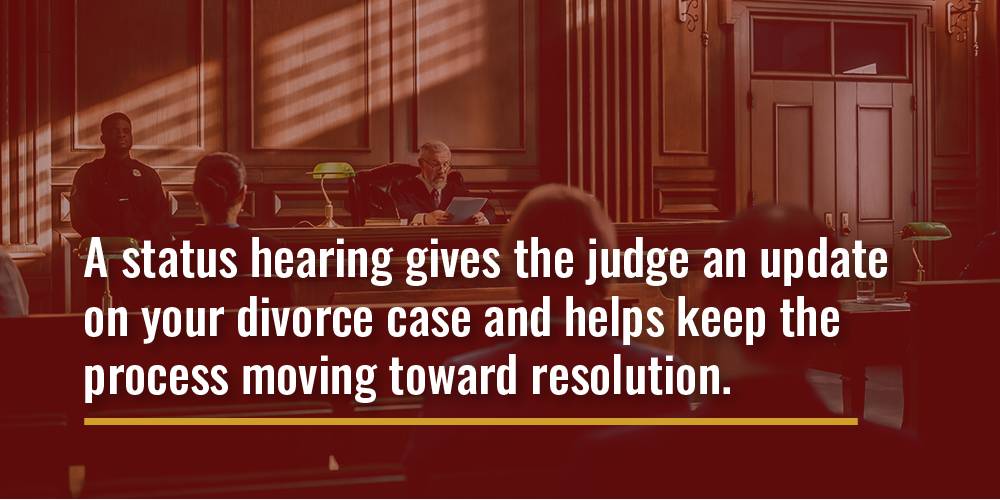 630-393-3111
630-393-3111
4200 Cantera Drive, Suite 200 | Warrenville, IL 60555
What is an Illinois Status Hearing and What Should I Expect?
 At some point during your Illinois divorce, your attorney may tell you there is an upcoming status hearing, but you may never have heard that phrase before. Your divorce can involve several steps, including status hearings, motions, interrogatories, and even a deposition. If you and your spouse cannot agree on important issues, the case may move to a pre-trial and possibly a trial.
At some point during your Illinois divorce, your attorney may tell you there is an upcoming status hearing, but you may never have heard that phrase before. Your divorce can involve several steps, including status hearings, motions, interrogatories, and even a deposition. If you and your spouse cannot agree on important issues, the case may move to a pre-trial and possibly a trial.
A status hearing allows both parties to inform the court about any progress made on previously identified issues and to determine next steps. While it may be unfamiliar to you, your Naperville, IL divorce lawyer can guide you through your status hearings and help you work toward the best outcome possible.
What Issues Are Discussed During a Status Hearing?
Status hearings can address a variety of issues, such as:
-
Development of a parenting plan
-
Allocation of parental responsibilities
-
Determination of marital and separate assets
-
Division of marital assets
-
Determination of child support
-
Whether spousal support is appropriate and, if so, how it will be calculated
-
Updates on any new agreements reached since the last hearing
-
Filing of pre-trial requests such as Motions to Compel, Petitions for Support, or Petitions to Modify Support
-
Deadlines for finishing discovery
If you and your spouse have already agreed on certain parts of the divorce, those will not need to be discussed at a status hearing. For the issues that remain unsettled, your lawyer and your spouse’s lawyer will bring them up in front of the judge to try to resolve.
During the hearing, the judge may suggest ways to help both sides move closer to an agreement. If there is no progress, the judge might order mediation or another type of dispute resolution. At the final status hearing, a pre-trial date will be set to deal with case planning. This planning covers the exhibits that will be presented and the witnesses who may testify. It also sets the length of opening and closing arguments. The judge may also limit which disputes will go to trial. After the pre-trial, the court will set the trial date.
Do I Have to Go to Every Status Hearing in Illinois?
Whether you need to attend depends on the specific circumstances of your case. Sometimes, judges prefer the parties to be present, especially when parenting issues are on the table. Under 750 ILCS 5/602.10, Illinois law requires divorcing parents to submit a parenting plan within 120 days after service or filing of the petition. If parents disagree, the judge may use a status hearing to set deadlines or order mediation. Your presence allows the court to ask you questions directly and ensures you understand what deadlines you must meet.
In financial matters, your lawyer can often appear on your behalf. However, if the court is considering temporary support or discovery disputes, your testimony may be needed. Always ask your attorney if you should attend so you do not miss an opportunity to protect your interests.
What Happens if Deadlines Are Missed Before a Status Hearing?
Status hearings often serve as checkpoints to ensure both sides are following the rules. For example, Illinois Supreme Court Rule 213 requires both sides to share the names of witnesses and the opinions those witnesses will share during discovery, which is the process of exchanging information before trial. If one spouse does not follow this rule, the other can ask the judge to order compliance through a Motion to Compel. The judge may respond by extending deadlines, limiting what evidence can be used, or imposing other penalties.
Missing deadlines can slow down the case and affect how the court views the situation. If the judge notices repeated delays, they may be less likely to grant certain requests in the future.
How Long Do Divorce Status Hearings Take?
Most status hearings are short, sometimes lasting less than 15 minutes. They are not designed for lengthy arguments. If more discussion is needed, the court may schedule a longer hearing or a special motion call. Even though the hearings are brief, the results can significantly shape the course of your divorce. For example, suppose you and your spouse disagree about property division, governed by 750 ILCS 5/503. The judge may set deadlines for actions like appraisals, financial affidavits, or mediation. This keeps the case moving toward resolution rather than lingering indefinitely.
What Happens at a Divorce Trial in Illinois?
Unfortunately, many months may have passed since the divorce was initiated by the time a divorce trial finally takes place. Facts, witnesses, and exhibits will be presented by both sides. The judge will make final decisions regarding any unresolved divorce issues. If one spouse believes the court has made an error in its decision on any of the issues, he or she has 30 days from the date the Judgment for Dissolution of Marriage is entered to appeal the decision to the Illinois Appellate Court.
Trials are generally longer and more formal than status hearings. Witnesses must testify under oath, exhibits are reviewed, and each side gives opening and closing statements. The trial ends with a judgment that settles all remaining matters, including child custody, support, and property division.
Can a Divorce Be Settled After a Status Hearing?
Many divorces never make it to trial because settlements are reached after or even during a status hearing. Judges encourage spouses to resolve disputes whenever possible. A signed marital settlement agreement can be entered at any stage of the process, saving both time and money.
For instance, if you agree on spousal maintenance, also known as alimony, that agreement can be presented to the court. The judge will review it to make sure it is fair and not unconscionable, meaning so one-sided or unfair that it would be unreasonable to enforce. If approved, the agreement becomes part of the divorce judgment, eliminating the need for further litigation on that issue.

Contact a Naperville, IL Divorce Lawyer Today
At Calabrese Associates, P.C., we guide clients through every stage of the divorce process, including status hearings and settlement discussions. If needed, we are also prepared to represent you at trial. Attorney Michael J. Calabrese, a former chair of the DuPage County Bar Association Family Law Committee, has also lectured extensively on family law matters. His dedication to the field has earned him the highest Avvo rating as a Top Attorney.
When the outcome of your case affects your family and your future, you need trusted guidance and proven skill. Our team is committed to protecting your rights and helping you move forward with confidence. To learn more or schedule a consultation with an experienced DuPage County, IL divorce lawyer, call 630-393-3111 today.


 4200 Cantera Drive, Suite 200, Warrenville, IL 60555
4200 Cantera Drive, Suite 200, Warrenville, IL 60555 630-393-3111
630-393-3111





